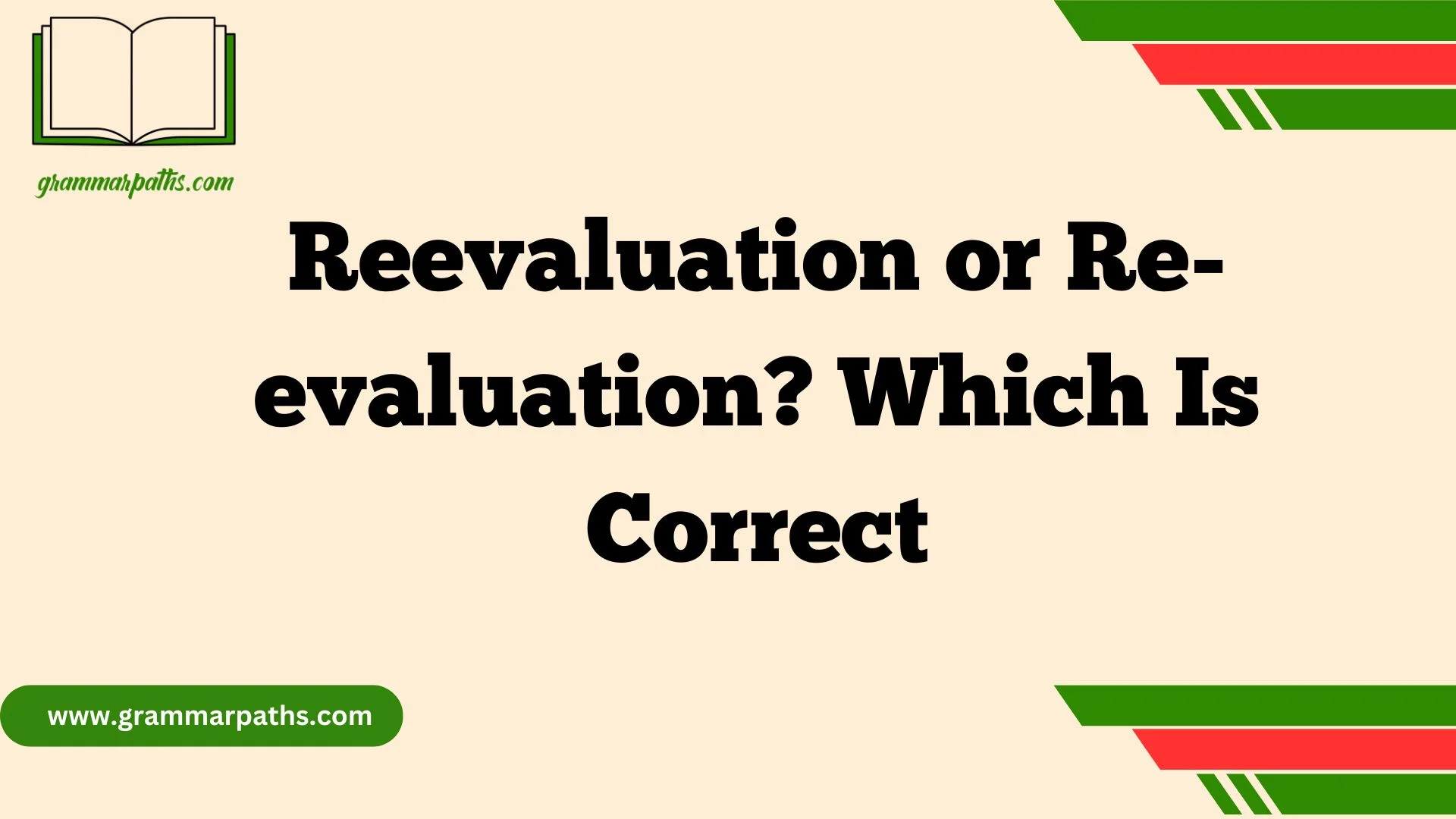In the world of grammar, even the tiniest punctuation mark can spark big debates. One such example is the spelling conundrum: “Reevaluation” or “Re-evaluation?” This question might seem trivial, but it matters more than you’d think—especially in professional, academic, and editorial writing. Both forms appear frequently in English texts, yet only one tends to dominate depending on regional preference, writing style, and publishing standards.
The core issue boils down to hyphenation rules and how they’ve evolved over time. Should you stick with the hyphenated form for clarity, or drop the hyphen for modern simplicity? In this article, we’ll explore the meaning, usage, and origin of both “reevaluation” and “re-evaluation,” explain when to use each, and break down the difference according to American and British English conventions.
Whether you’re writing a formal document, editing content, or simply aiming to improve your English vocabulary, understanding which form is correct—and why—can make your communication sharper and more consistent. Let’s dive into the rules, examples, and expert guidance to settle the “reevaluation vs. re-evaluation” debate once and for all.
What Does Reevaluation Mean?
Reevaluation refers to the process of assessing something again—looking back with fresh eyes, reconsidering prior decisions, or remembering performance or criteria.
Definition:
Reevaluation (noun): The act of reviewing or analyzing something again, often to determine if previous conclusions or judgments were accurate.
Common Use Cases:
- Education: Reevaluating a student’s progress
- Healthcare: Reevaluating a patient’s treatment plan
- Corporate Strategy: Reevaluating business goals mid-quarter
- Mental Health: Personal reevaluation during therapy
- Politics & Policy: Reevaluating international relationships
Sentence Examples:
- “After the quarterly losses, the company initiated a full reevaluation of its marketing approach.”
- “The therapist suggested a reevaluation of her coping strategies.”
The term is rooted in Latin, from “re-” (again) and “evaluate” (to assess or determine value).
Reevaluation vs. Re-evaluation: What’s the Difference?
While both reevaluation and re-evaluation mean the same thing, their visual and structural forms differ due to a hyphen.
| Aspect | Reevaluation | Re-evaluation |
| Type | Closed compound word | Hyphenated compound word |
| Region (common) | American English | British, Canadian English |
| Formality | Modern, casual/formal | More formal or traditional |
| Pronunciation | Identical | Identical |
Key Takeaway:
- There is no difference in meaning between the two forms.
- The difference is orthographic (relating to spelling), not grammatical or semantic.
Which Spelling Is Correct—Reevaluation or Re-evaluation?
Both spellings are grammatically acceptable, but correctness depends on context.
According to Major Style Guides:
| Style Guide | Preferred Spelling |
| APA (American Psychological Association) | Reevaluation |
| Chicago Manual of Style | Reevaluation (favors closed compounds) |
| Oxford Style Manual | Re-evaluation |
| MLA | Both accepted (consistency recommended) |
Regional Preferences:
- United States: Reevaluation (without hyphen)
- United Kingdom: Re-evaluation (with hyphen)
- Canada and Australia: Often follow UK spelling
💡 Pro Tip: Use the version that aligns with your target audience’s region or the style guide you’re following.
When Should You Use Reevaluation (No Hyphen)?
Reevaluation is the preferred form in modern American English, especially in academic, digital, and corporate contexts.
Use This Version If:
- You’re writing for an American audience
- You’re following APA, MLA, or Chicago style
- You’re drafting digital content, blog posts, or UX copy
- You’re preparing government or business documents in the U.S.
Examples:
- “We are planning a reevaluation of our hiring strategy.”
- “The judge ordered a reevaluation of the evidence.”
Facts:
- Google Ngram Viewer shows a sharp increase in “reevaluation” usage in U.S.-published books since the 1970s.
- Popular U.S. institutions like Harvard and Stanford use the “reevaluation” spelling in official publications.
When Should You Use Re-evaluation (With Hyphen)?
Re-evaluation is typically used in British English and other Commonwealth countries, where hyphenation rules tend to be more conservative.
Use This Version If:
- Your audience is in the UK, Canada, or Australia
- You’re submitting to a British journal or university
- You’re aiming for formal or academic tone
- You’re working in publishing, editing, or academic proofreading
Examples:
- “A re-evaluation of economic policy is urgently needed.”
- “Their work requires constant re-evaluation of data accuracy.”
How to Choose the Right Version for Your Writing
If you’re unsure which form to use, follow this simple table:
| Audience or Context | Recommended Spelling |
| U.S. professional writing | Reevaluation |
| U.K. academic writing | Re-evaluation |
| Global digital blog | Either, stay consistent |
| Academic journal (APA) | Reevaluation |
| British editorial publication | Re-evaluation |
Questions to Ask Yourself:
- What region is my audience in?
- Am I using a specific style guide?
- Does readability matter (e.g., back-to-back vowels)?
- Is the term used frequently in the text? (Consistency matters more)
Other Words Like Reevaluation/Re-evaluation
This pattern isn’t unique. Many words starting with “re-” have similar issues when the prefix meets a vowel.
Common Examples:
| Word | American English | British English |
| Reenter | Reenter | Re-enter |
| Reexamine | Reexamine | Re-examine |
| Reeducate | Reeducate | Re-educate |
| Reemerge | Reemerge | Re-emerge |
| Reevaluate | Reevaluation | Re-evaluation |
✨ Rule of Thumb: If the prefix “re-” ends in a vowel and the root word starts with the same vowel, hyphenation improves readability.
Common Mistakes and How to Avoid Them
Even professional writers occasionally trip over compound words. Here are the most frequent errors and how to fix them.
Mistake List:
- ❌ Using both versions inconsistently in the same article
- ❌ Adding an unnecessary hyphen in American English
- ❌ Relying solely on spellcheck (it may default to your OS language settings)
- ❌ Copy-pasting from sources without proofreading spelling consistency
Fixes:
- ✅ Decide on one version and use it consistently
- ✅ Use Grammarly Premium or ProWritingAid for style-specific checks
- ✅ Set your document language settings correctly (U.S. vs. U.K.)
Grammar Tip: Closed Compound vs. Hyphenated Compound
Understanding the structure helps you make better editorial decisions.
Closed Compound:
- Definition: Two words joined to form one
- Example: Reevaluation, brainstorming, notebook
Hyphenated Compound:
- Definition: Two words joined by a hyphen
- Example: Re-evaluation, long-term, editor-in-chief
Quote from The Chicago Manual of Style:
“The trend in English is toward closed compounds, especially those that are commonly used.”
Should You Rely on Spellcheck?
While spellcheck tools are helpful, they’re not foolproof when it comes to regional variations or stylistic preferences.
Facts:
- MS Word (U.S.) flags “re-evaluation” as a potential error.
- Grammarly suggests “reevaluation” in default U.S. settings.
- Google Docs accepts both but doesn’t always alert to inconsistency.
Best Practices:
- Don’t rely solely on autocorrect.
- Set your dictionary based on your intended audience.
- Use language-specific grammar plugins for consistent editing.
Final Verdict: Reevaluation or Re-evaluation?
The answer lies in who you’re writing for and what style you need to follow.
- Both are correct.
- Reevaluation is standard in the United States and modern digital writing.
- Re-evaluation is used in British English, academia, and formal publishing.
Rule to Remember: “Write for your reader, not just your rulebook.”
Be consistent, be purposeful—and now that you know the difference, you’ll never second-guess it again.
FAQs
Is it re-evaluation or reevaluation?
Both forms are correct, but “reevaluation” is preferred in American English.
“Re-evaluation” is more common in British English and includes a hyphen for clarity.
Does reevaluation have a hyphen?
In American English, “reevaluation” is usually written without a hyphen.
The hyphenated version “re-evaluation” is mainly used in British English.
Is there a word reevaluation?
Yes, “reevaluation” is a valid word, especially in U.S. English usage.
It means the act of reassessing or reviewing something again.
Is it revalue or reevaluate?
“Revalue” means to change the value, often monetary, of something.
“Reevaluate” means to reassess or reconsider a situation, idea, or decision.
Is “revalue” a word?
Yes, “revalue” is a legitimate word, typically used in economic or financial contexts.
It refers to assigning a new value, often involving currency or assets.
What is reevaluation Oxford dictionary?
According to the Oxford Dictionary, “re-evaluation” is the British spelling.
It is defined as “the action of assessing something again, especially with new facts or a changed context.”
Conclusion:
In a world that’s constantly changing, reevaluation is more than just a second look—it’s a powerful tool for adaptation, growth, and clarity. Whether you’re conducting a personal reevaluation, engaging in a professional performance review, or performing a medical re-evaluation, this process allows for reflection and realignment with your current goals, values, or data. A thoughtful reevaluation strategy can uncover blind spots, correct course, and foster better outcomes.
From reevaluation in education to reevaluation of business goals, this practice supports better decision-making and more meaningful outcomes. It encourages us to stay flexible, open-minded, and willing to reassess our assumptions or previous judgments. With the right reevaluation plan, you can identify what’s working, what isn’t, and how to move forward with intention.
Ultimately, reevaluation is about making smarter choices based on new insight. It’s a sign of strength—not doubt—to revisit past decisions. Whether it’s a reevaluation of performance, a reevaluation of goals, or a broader life reevaluation, embracing this process can lead to better results and deeper understanding. Take the time to reassess, readjust, and redefine your path—your future self will thank you.

Mia Rose is the passionate writer and founder of GrammarPaths.com, a resource dedicated to helping learners master English grammar, idioms, and writing skills with ease. With a deep love for language and years of experience in teaching and content creation, Mia simplifies complex grammar rules into clear, practical guides that readers can instantly apply.












